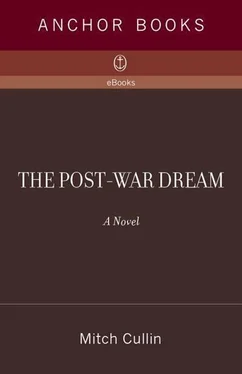Then how unanticipated it was, Hollis realized, that the hometown he had previously decided wasn't worth revisiting should now feel so missed. Already letters were delivered to him from Critchfield, sent mostly by people whom he couldn't immediately recall — the woman who ran the local florist shop, a bar owner, a high-school student whose older brother had once bullied him for a nickel — all wishing a speedy recovery, explaining how incredibly proud they were of him. Never before in his life had an outpouring of random kindness come his way, nor had he ever received letters from much of anyone, let alone letters of praise. In less than a year, it seemed, he had shaken loose the skin of an awkward town loner to become Critchfield's current war hero, achieving the distinction without fully understanding that he was, indeed, perceived as such.
Only later would Hollis learn of the photograph which had appeared in The Critchfield Gazette , taken by the day-nurse supervisor while he rested in his orthopedic bed, mildly narcotized and not yet capable of standing on his own; rugged, large, pale hands decorously laid a Purple Heart upon his blanket-covered stomach as if the medal were a tiny wreath — and he stared up at the tall, imposing figure of Captain Z. L. Trendon, his pupils completely dilated below an immaculately uniformed, silver-haired man who, looming above him like one accustomed to the pulpit, spoke with a deep, tremulous voice: “In the name of the President of the United States and as authorized by reference A of your citation, you — PFC Hollis J. Adams — are hereby awarded the Purple Heart Medal for wounds received in action against the enemy on the eleventh of August 1950 in the Korean theater of operations.”
“Hold it a sec,” the nurse supervisor said, hoisting the camera. “Oh, yes, right there, that's it — ”
The captain became suddenly inanimate, gazing down at Hollis with an unflinching, benevolent expression, staying perfectly frozen while the camera took aim, clicking and flashing twice. “Good job, son,” the captain said, springing back into motion and firmly clutching Hollis's pliable right fingers; afterward, the man promptly about-faced, striding out into the middle of the ward — where he stopped for a moment, surveying the injured in their beds, saying loudly so everyone in the ward could hear, “God bless every single one of you.” With that, the captain flexed his shoulders and sauntered toward the far doors, clasping his hands behind his back — the nurse supervisor jogging ahead of him to hold the doors open, the camera dangling at her side.
But the photograph wasn't intended as a personal memento; it was, in fact, destined for the offices of the local Critchfield newspaper, along with a copy of the Purple Heart citation and a short press release specifying his bravery at the Naktong River. Had Hollis's mother and stepfather not been officially informed of his wounded status early on — or had he not seen fit to have his medal sent home for safekeeping with a brief note attached ( I'm okay, Don't worry. I'll be home soon. H.A. ) — they would have first heard of his overseas military service and injury when one of them stooped to retrieve the Gazette from the porch steps, a front-page headline proclaiming: local boy awarded purple heart, act of heroism under fire quells enemy sniper.
Then, in turn, it would be Hollis's mother, Eden, who was slow to respond, eventually sending him a clipping of the newspaper article with a brief note, simply stating: Glad you're doing okay and you're safe. Keep me informed. Your bedroom is ready whenever you are. Love, Mom . Thereafter, she began sending weekly notes — each missive a little longer than the previous one — with the notes soon evolving into full-blown letters, often accompanied by a package containing homemade chocolate chip cookies, or sand tarts, or shelled pecans. Eden wouldn't, however, travel to see him at the hospital, nor did he ever ask her to visit. He suspected she was waiting for him to come to her, staying put as a silent protest against the son who had run off, departing angrily from her life, joining the army without making any effort to inform her of where he had gone. But she continued writing every week, and he was always quick with his replies. Their letters grew less stilted — the sentences becoming more demonstrative, the general tone warmer — yet were careful to avoid the hurt feelings or irritations both harbored; in this manner they overlooked whatever resentment lingered between them, an indirect healing which would be repeated again and again throughout the years, reconciling their relationship via long distance while never actually speaking their minds.
When Eden's first note finally reached him, Hollis was already maneuvering on his feet, albeit with a single crutch; he had, by then, received half a dozen letters from Critchfield citizens, and, over the course of several evenings, he had responded to them all, thanking each person for their kind thoughts, concern, and encouraging words. But it wasn't until he studied the newspaper article — the black-and-white photograph, the three columns of journalistic hyperbole — that he realized something was amiss, that somehow the truth had been altered without really being changed. The written account explained the event correctly — a sniper had killed a fellow soldier, and Hollis had, after also being shot, killed the sniper on the banks of the Naktong while in hot pursuit. Aside from a number of false adjectives (eagle-eyed, valiant, stouthearted), nothing else in the article had been totally distorted. Although the hours and minutes leading up to the shootings, or the actual deaths themselves, were lacking from the story; instead, the moment was reshaped with surface details which conveyed a cinematic sweep — close-range gunfire, beads of sweat, grim determination — rather than the eerie stillness of that fateful morning, the mutual dislike fostered between two Garryowens, a stolen pack of cigarettes, and a fallen Korean boy with a Japanese rifle.
Nonetheless, Hollis wouldn't explain otherwise, nor would he do much to downplay his role as a minor war hero of sorts; for he had killed a communist sniper, he had been wounded, he had possibly prevented other soldiers from being shot at that morning — it made no difference to the townfolk of Critchfield if he was or wasn't highly decorated for his actions. To those who wrote him, his role was subconsciously envisioned in Technicolor, befitting the likes of Audie Murphy. Ultimately, his mind adjusted itself to accommodate how he was now regarded. Compared to the surreal, entangled facts of Korea, the superficial yet grand revisions were much easier to adopt and live with, and, as it happened, the revisions then functioned like a glowing portal which had appeared in front of him, shining white light across its threshold, beckoning him to pass through to find something better for himself. These assumed three-quarter truths, he would tell himself, weren't exactly lies.
On Halloween Day 1950, Hollis was given a brand-new regulation uniform to wear, cab fare for the Greyhound bus depot in downtown Oakland, and, as a parting gift bestowed upon him by the nursing staff, a mahogany cane to use on his trip home. With whatever few possessions he had acquired shipped on ahead, he clutched only at the cane, limping out of the hospital before dawn, moving toward a waiting Yellow Cab. Seconds later, the naval hospital slid from view, and he found himself emerging into another world — a land of dim urban streets, of brick buildings and unlit storefronts. In the gaps between the buildings he stole glimpses of a waning, reddish moon which sank for the horizon line; its faint glow was in contrast to the opalescence which had started washing over the streets and parked cars. These Bay Area mornings, it had seemed to him, always arrived quickly, as if a curtain were being lifted. So dawn had already begun, heralded by the warbling of birds greeting him when he climbed slowly from the cab; the darkness which had, minutes earlier, engulfed him at the hospital was being eaten away by the sun.
Читать дальше










![Theresa Cheung - The Dream Dictionary from A to Z [Revised edition] - The Ultimate A–Z to Interpret the Secrets of Your Dreams](/books/692092/theresa-cheung-the-dream-dictionary-from-a-to-z-r-thumb.webp)

